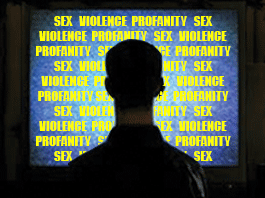- Because Our Children Are Watching
- Join the Cause
- Donate
Written by PTC | Published March 7, 2014
 In a March 6th column, Time TV critic James Poniewozik quotes interviews with several producers of pay-TV programming. In one, Nic Pizzolatto, creator of HBO’s True Detective, admits:
“There is a clear mandate in pay-cable for a certain level of nudity. Now, you’re not going to get our two lead movie stars to go full-frontal, but we at least got Matthew’s butt in there. There’s not a great deal of nudity in the series at all, though, compared to other shows on pay-cable. I’d be happy with none. Seems to me if people want to see naked people doing it, there’s this thing called the internet.”
In his article, Poniewozik rhapsodizes over the nudity in The Sopranos’ strip-club scenes, claiming that it “told you want kind of world Tony Soprano lived in.” (Apparently, cable’s “more sophisticated” viewers couldn’t figure out that mob bosses live sordid lives without strippers gyrating in the background. Strangely, in many movies Jimmy Cagney managed to convey the fact that he was a gangster without any strippers around. How is it that the supposedly less “sophisticated” audiences of 70 years ago didn’t need such things spelled out for them?)
But even Poniewozik admits that “it would be easier to make the case for nudity as a dramatically necessary way of representing life if not for quotes suggesting that cable networks do feel obligated to deliver a Minimum Daily Requirement of Butts.” The Time journalist then goes on to quote an interview with an anonymous producer of Game of Thrones who ordered the show’s director, “I represent the pervert side of the audience, and I’m saying I want full frontal nudity in this scene.”
When even one of journalism’s most stalwart defenders of cable’s most explicit content, admits that much of its nudity exists only for sordid titillation, not for any valid storytelling purpose, it is clear that cable is broken. It is especially so considering that millions of pay-TV subscribers, who only want to watch Disney or the Golf Channel, are forced to pay for explicit sexual content and graphic violence. Only when Cable Choice is achieved will viewers have the power NOT to pay for content they don’t watch and don’t want.
To learn more about PTC’s Cable Choice campaign, click here.
In a March 6th column, Time TV critic James Poniewozik quotes interviews with several producers of pay-TV programming. In one, Nic Pizzolatto, creator of HBO’s True Detective, admits:
“There is a clear mandate in pay-cable for a certain level of nudity. Now, you’re not going to get our two lead movie stars to go full-frontal, but we at least got Matthew’s butt in there. There’s not a great deal of nudity in the series at all, though, compared to other shows on pay-cable. I’d be happy with none. Seems to me if people want to see naked people doing it, there’s this thing called the internet.”
In his article, Poniewozik rhapsodizes over the nudity in The Sopranos’ strip-club scenes, claiming that it “told you want kind of world Tony Soprano lived in.” (Apparently, cable’s “more sophisticated” viewers couldn’t figure out that mob bosses live sordid lives without strippers gyrating in the background. Strangely, in many movies Jimmy Cagney managed to convey the fact that he was a gangster without any strippers around. How is it that the supposedly less “sophisticated” audiences of 70 years ago didn’t need such things spelled out for them?)
But even Poniewozik admits that “it would be easier to make the case for nudity as a dramatically necessary way of representing life if not for quotes suggesting that cable networks do feel obligated to deliver a Minimum Daily Requirement of Butts.” The Time journalist then goes on to quote an interview with an anonymous producer of Game of Thrones who ordered the show’s director, “I represent the pervert side of the audience, and I’m saying I want full frontal nudity in this scene.”
When even one of journalism’s most stalwart defenders of cable’s most explicit content, admits that much of its nudity exists only for sordid titillation, not for any valid storytelling purpose, it is clear that cable is broken. It is especially so considering that millions of pay-TV subscribers, who only want to watch Disney or the Golf Channel, are forced to pay for explicit sexual content and graphic violence. Only when Cable Choice is achieved will viewers have the power NOT to pay for content they don’t watch and don’t want.
To learn more about PTC’s Cable Choice campaign, click here.